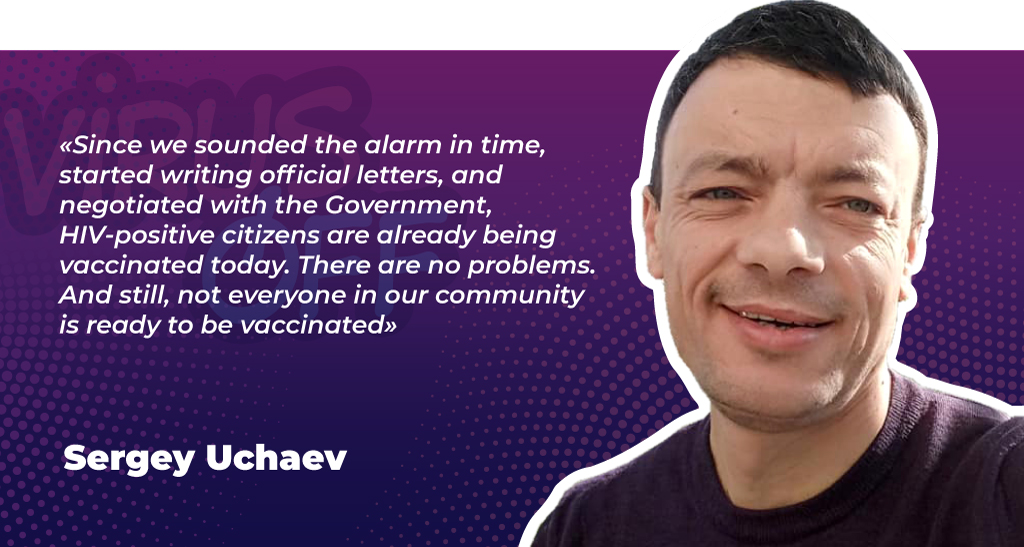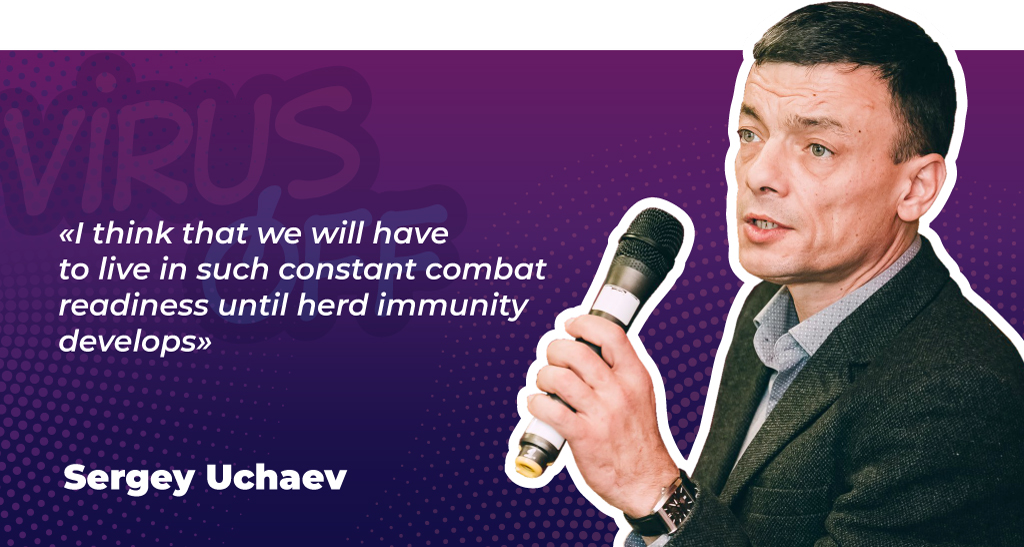The pandemic is not to be trifled with. But a constructive dialogue is the very thing. Today’s hero Sergey Uchaev, chairman of the Public Association of people living with HIV in Uzbekistan, Tashkent, NGO “Ishonch va Hayot” is confident about this. Contrary to official rules, Sergey was one of the first to get vaccinated against COVID-19 and did not regret it a bit.
Sergey, Uzbekistan has a shallow level of vaccination against COVID-19 – according to official data, only 17% of the population is fully vaccinated in the country. What do you think could be the reason?
People are just afraid, that’s all. They are worried that this is some kind of conspiracy. They are scared that after the vaccine, it will be even worse. There is a lot of false information on social networks that allegedly, after vaccination, the state of health worsens, long-term adverse effects occur, and stuff like that. Although many legislative obligations have been and are being taken, for example, oblige employers to make sure that the majority of employees are vaccinated, information campaigns are being carried out. We have introduced mandatory vaccination of doctors, teachers, employees of educational institutions. However, this does not work for the general population. At the very beginning of the pandemic, we created a commission to combat COVID-19. Then the list of categories of people for whom the vaccine was not recommended included patients with diabetes mellitus, hypertension, people living with HIV, and others. Since we sounded the alarm in time, started writing official letters, and negotiated with the Government, HIV-positive citizens are already being vaccinated today. There are no problems. And still, not everyone in our community is ready to be vaccinated.
Have you been vaccinated?
Of course, moreover, I was vaccinated when there was still a restriction for people living with HIV. I went to get vaccinated not at the registration but at the residence. Most likely, they would have refused me at the registration place since I am registered at a local clinic, where they are well aware of my status. Therefore, I went to the area of residence, where no one asked me unnecessary questions, and got vaccinated with no problem.

As for the general population, people can get the vaccine in polyclinics and shopping centers, for example. Or during actions in other public places.
What vaccines are available in Uzbekistan?
There is also the Russian ” Sputnik ” almost everything – Pfizer, Moderna, Astra-Zeneca, there is also the Russian “Sputnik.” We even have the Uzbek-Chinese RBD-Dimer vaccine. It was one of the first to be brought into the country. Anyone can choose the vaccine that is right for them. “We have no problems with that at all.
Do you think the Government has successfully fought the pandemic all this time? As a citizen, did you feel protected?
The measures were taken tough, it’s true. There was a complete lockdown in the country for 4 or 5 months; people were fined for not wearing masks. We are accustomed to gathering for weddings of 500 people, but now we were forbidden to gather in groups of more than 30 people at all. But huge festivals are in our blood! The Government has taken this issue seriously. Yes, some people were unhappy with it. It was the right decision. We urgently deployed mobile hospitals, opened COVID-19 testing centers, and increased salaries for doctors. The public also got involved, handing out masks to people for free, giving them a lift when transport was suspended, organizing the delivery of food, medicines, and ARVs.
What is the situation now?
The situation is relaxed; people hardly wear masks. Even though there is an official decision. Many people survived coronavirus in a mild form, so they have already ceased to be afraid. My wife and I were recently in Istanbul for work, and there is a strict mask regime. At first, out of habit, I walked without a mask, so people looked at me with wide eyes; for them, it seemed barbarism. Due to new strains, we have again introduced restrictions on crowded gatherings, physical distance is mandatory, but the public does not permanently attach importance to this. As soon as the measures are tightened, people start to resent. You know, when at the very beginning there was news about who exactly became the “zero” patient and who began the pandemic, the person was subjected to severe discrimination. And now everyone understands that this is inevitable; we will all get sick someday.
Were you sick too?
Yes, that was in September 2020. My wife and I got sick. Both were treated at home. My wife survived it more accessible; I’m more demanding. Of course, there was fear, there was excitement that you would have to be hospitalized, that you would end up in the hospital. But everything was ok. I remember how I came to the hospital for an examination, and there, I saw people brought in wheelchairs, on stretchers, in oxygen masks that looked scary. So I got lucky, it was ok.
Has the pandemic changed your schedule?
Of course, especially during the lockdown period, when we all worked remotely, it was impossible even to go to the city on your own vehicle. We then received permission as a public organization, and our employees delivered ARV drugs. This lasted four months. At first, it was unusual, and then more or less, we adapted. I was even comfortable, and I didn’t have to waste time on the road to the office; all issues were resolved online. It was a time saver. Now we are working; as usual, there are no problems.
What has this pandemic taught you?
I began to pay more attention to my health. I recently went in a taxi with my wife, and there the driver sniffs and sniffs. We have already pulled the masks on the most I don’t want to, but it was still scary. He, of course, apologized at the end, but throughout the trip, it was somehow frightening. What if we catch COVID-19? When you get into a public place and see crowds of people without a mask, I feel uncomfortable. If you have any symptoms, do a test right away or stay at home. Trying to keep your body strong.
Do you think COVID-19 will stay with us forever?
Yes, of course, we see that new strains are constantly emerging. The virus is mutating. I think that we will have to live in such constant combat readiness until herd immunity develops. On the other hand, we even adapted our work to the restrictions associated with COVID-19: now we budget to purchase masks, disinfectants, and rapid tests. We do all this primarily to protect ourselves.

Do you have to motivate people somehow to get vaccinated?
Constantly I cite myself as an example and those who have been vaccinated. For some, it works; for some, it doesn’t. Of course, some act defensively: “Never in my life.” You won’t persuade them. But we, for example, began to conduct training seminars on a regular basis. Very soon, according to the plan, we have a workshop on vaccination and diagnostics for social workers and peer consultants. This is how we try to convey specific evidence-based information so that they, in turn, can motivate beneficiaries to get vaccinated. Our main message is that people living with HIV need to be vaccinated.
By the way, do you unfriend anti-vaccinators on social networks?
No, on the contrary, I try to dialogue with them. I send some scientific articles, studies, contacts of doctors infectious disease specialists; I am ready to speak and try to change their point of view reasonably.
I hope our interview will convince someone.
Me too.
Text: Elena Derzhanskaya
Photo: personal archive of the hero
A series of materials created supported by UNAIDS




